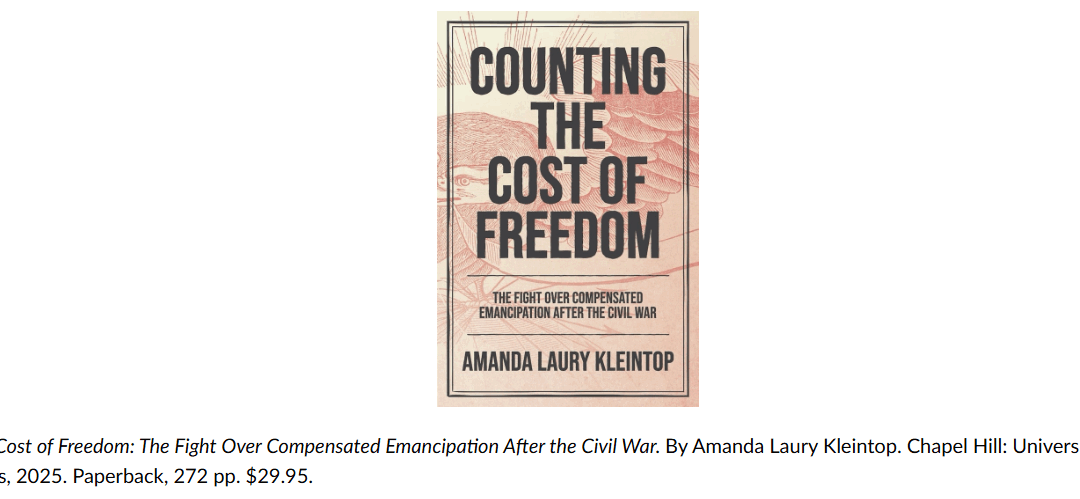In the summer of 1857, abolitionist Rev. John Rankin, at a meeting of the National Emancipation Convention in Cleveland, Ohio, advocated for compensated emancipation as the only viable way to end slavery in the United States. “Life was more precious than money, and… freedom was more precious than money,” Rankin stated.[1] While it is true that the value of life and freedom is incalculable, not all abolitionists viewed compensated emancipation as plainly as Rankin. Compensated emancipation, as Amanda Laury Kleintop argues in this deeply researched, engagingly written, and cogently argued volume, is not only a complex topic, one that sparked fierce debate before the Civil War and during the conflict, but was at the epicenter of American political life and the shaping of historical memory for decades after the Civil War’s end.
Kleintop, a history professor at Elon University, after providing context on how various nations around the world used compensated emancipation as a tool to abolish slavery, skillfully examines how the United States government viewed compensated emancipation and how it was implemented, on a limited scale, during the Civil War. Additionally, the author does an excellent job of exploring why some opposed offering financial compensation to enslavers. Although it would indeed make abolition perhaps more palatable to enslavers, Kleintop powerfully demonstrates that those who opposed it did so because it rewarded enslavers, without any compensation to the enslaved.
While the author does a remarkable job of exploring the nuances of wartime compensated emancipation, the real strength of this book is Kleintop’s keen analysis of how wartime debates over compensated emancipation shaped the development of the Fourteenth Amendment. While most recognize the Fourteenth Amendment for guaranteeing citizenship to all people born or naturalized in the United States and due process, the oft-overlooked section 4 ensured that the United States government would never compensate enslavers.
Despite the codification that the United States would never “assume or pay any debt… for the loss or emancipation of slaves,” Kleintop’s fascinating study blatantly shows that former enslavers after the Civil War sought compensation. Despite the illegality of compensating former enslavers, Kleintop provides overwhelming evidence that at various points in the final decades of the nineteenth century, Republicans and Democrats employed compensated emancipation as a political tool. Republicans used it as a bogeyman and warned that if Democrats won, they would undo the Fourteenth Amendment and compensate former enslavers. Interestingly, Kleintop also reveals that some political hopefuls, such as John H. Williamson, who was once enslaved in Georgia, advocated compensating formerly enslaved people and their enslavers when he ran for a Congressional seat in 1892, as a way to reconcile former foes.
Beyond a fascinating exploration of the nuances of compensated emancipation and its place in America’s political landscape in the postwar decades, Kleintop’s study provides a fascinating examination of how ex-Confederates, after the conflict, downplayed the desire of former enslavers to be fully compensated for the people they enslaved. This, the author rightfully asserts, was critical to advocates of the Lost Cause who attempted to recast the Confederate war effort not as one to preserve slavery, but to safeguard states’ rights.
This exemplary book is essential for anyone interested in abolition during the conflict, the nuances of compensated emancipation, and the shaping of historical memory.
Jonathan A. Noyalas is the Hugh & Virginia McCormick Chair in Civil War History at Shenandoah University and director of Shenandoah’s McCormick Civil War Institute. He is the author or editor of seventeen books including most recently General Philip H. Sheridan: Life, War, and Memory (Routledge).
[1] The Cleveland Leader, August 27, 1857.
Reviewed by Jonathan A. Noyalas
–emergingcivilwar.com


